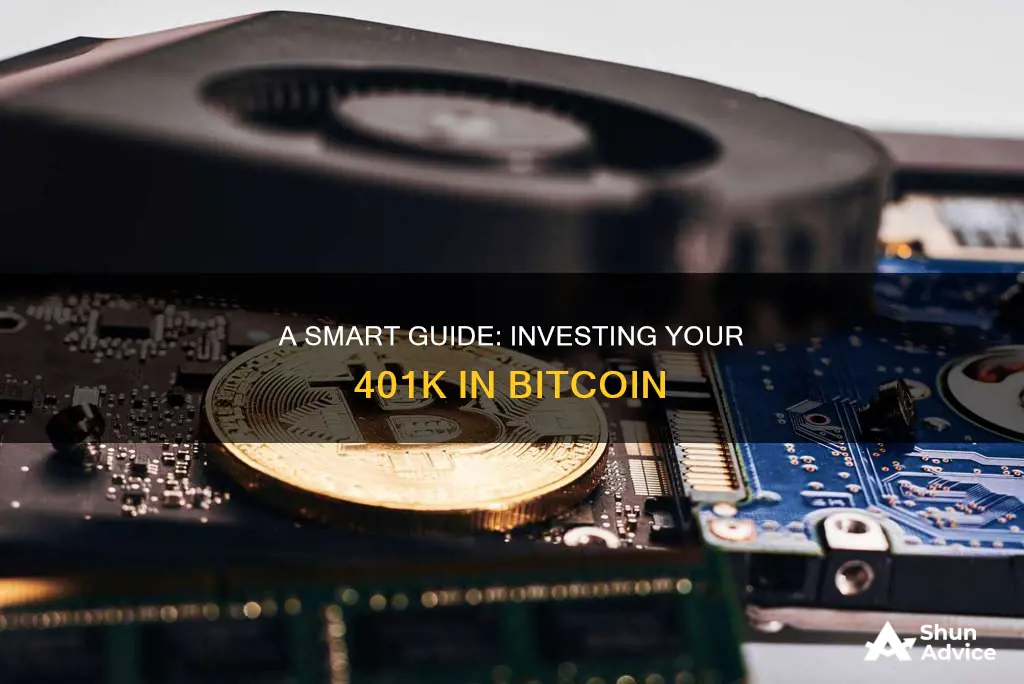
Investing in Bitcoin and other cryptocurrencies has become increasingly popular in recent years. While it is a risky and volatile investment, some people are interested in using their 401(k) retirement savings to invest in Bitcoin. In early 2022, Fidelity became the first major financial services firm to offer investors the option to add Bitcoin to their 401(k) retirement accounts. However, it's important to note that this decision lies with the employers, who have a fiduciary responsibility to their employees. This article will explore the pros and cons of investing in Bitcoin with your 401(k) and provide a step-by-step guide on how to get started.
| Characteristics | Values |
|---|---|
| First company to offer Bitcoin in 401(k) | Fidelity |
| Date of announcement | April 2022 |
| Maximum % of 401(k) account allowed in Bitcoin | 20% |
| Account fee | 0.75% to 0.9% of funds invested |
| Trading fee | Yes |
| Who decides if employees can add Bitcoin? | Employers |
| Bitcoin as an investment | Too volatile for a retirement investment |
| First company to offer cryptocurrency in 401(k) | ForUsAll |
| Number of cryptocurrencies offered by ForUsAll | 6 |
| Number of retirement plans that have made crypto available | 50 |
| % of investors investing in crypto | 12.5% |
| Average % of portfolio allocated to crypto | 4% |
| Crypto as an investment | Speculative and risky |
| Self-employed individuals and small business owners can use | Solo 401(k) |

Understand the risks
Investing in Bitcoin and other cryptocurrencies through a 401(k) plan is risky and highly volatile. Here are some key risks to consider:
Regulatory and Policy Risks
Cryptocurrencies are not widely recognised or regulated as a standard form of currency. The U.S. Department of Labor (DOL) has warned against investing in cryptocurrencies with retirement funds, citing the lack of regulation and policies surrounding their existence and use. This lack of regulatory oversight can expose your retirement funds to significant risks, and betting your future retirement on unregulated assets could be disastrous.
Volatility and Speculation
Cryptocurrencies, including Bitcoin, are subject to extreme price volatility due to speculation and valuation issues, resulting in wild price swings. This extreme volatility can be devastating to retirement savings and problematic for retirees who rely on this money for daily living. Even experts struggle to separate the real value of cryptocurrencies from speculative hype.
Security Risks
Digital assets like cryptocurrencies are often stored in digital wallets, making them vulnerable to hacking and theft. The DOL has expressed concerns about the significant risks of fraud, theft, and loss associated with cryptocurrencies.
Evaluation and Endorsement
It is challenging to evaluate cryptocurrencies as an asset accurately. Including a crypto option in a 401(k) menu could be interpreted as an endorsement by the plan manager, leading participants astray and causing losses. Currently, none of the proposed models for valuing cryptocurrencies meet the rigorous accounting standards applied to equities or debt analysis.
Impact on Retirement Planning
Bitcoin is not a cash-flowing equity; it does not pay dividends or distribute capital gains to its holders. Therefore, it may not align with the traditional goal of generating income through dividends and periodic withdrawals. Allocating funds to Bitcoin in a 401(k) should be done with caution and a clear investment thesis.
Emotional Decision-Making
The availability of Bitcoin in 401(k) plans may encourage emotional decision-making. Investors may be tempted to make knee-jerk reactions, such as selling in the short term, or allocating a large percentage of their retirement funds to Bitcoin without fully understanding the risks.
In summary, investing in Bitcoin through a 401(k) plan carries significant risks, including volatility, security threats, regulatory uncertainty, and the potential for emotional decision-making. It is crucial to thoroughly understand these risks and consult with a qualified financial advisor before making any investment decisions.
Gold Coin Investment: A Beginner's Guide to Getting Started
You may want to see also

Bitcoin's volatility
Bitcoin is a highly volatile asset. Volatility is a measure of how much the price of a financial asset varies over time. The more volatile an asset, the riskier it is to hold. Volatility also increases the cost of hedging, which is a major contributor to the price of merchant services.
Despite Bitcoin's volatility, investors have historically been well compensated for it. Bitcoin has a Sharpe ratio of 0.96 from 2020 to early 2024, meaning that while the "risk" in terms of standard deviation is higher, investors have been more than compensated for taking that risk.
Bitcoin's Sortino ratio of 1.86 is nearly double its Sharpe ratio, revealing that much of the volatility was to the upside. This is evident in Bitcoin's monthly price returns, which have a positive monthly return mean of 7.8% from 2016 to 2024, compared to the mean of 1.1% for the S&P 500.
However, it is important to note that Bitcoin's volatility makes it a risky investment, especially for retirement savings. As Ivory Johnson, a CFP and founder of Delancey Wealth Management, said, "As volatile as it is, it has the potential for huge upswings." Therefore, investors should exercise caution when allocating funds to Bitcoin in a 401(k) and ensure that they have a well-thought-out investment thesis and portfolio management rules.
The Ultimate Guide to Investing in Dogecoin via Cash App
You may want to see also

Self-Directed IRA
Investing in Bitcoin with a Self-Directed IRA has become increasingly popular in recent years. To do so, you must self-direct your IRA to be able to invest in alternative assets.
A Self-Directed IRA is a type of individual retirement account (IRA) that allows you to invest in alternative assets beyond the typical investments offered by regular IRAs, such as stocks, bonds, and mutual funds. These alternative investments can include "real estate, precious metals and other commodities, crypto assets, private placement securities, promissory notes, and tax lien certificates."
How to Set Up a Self-Directed IRA for Bitcoin Investing
- Establish and fund a Self-Directed IRA with a custodian: Choose a custodian that allows for self-directed investments and has experience with helping others invest.
- Form and register an LLC (Limited Liability Company): The LLC will be 100% owned by the IRA and will have the same tax-advantaged status. This is necessary because most crypto exchanges require you to set up an LLC to purchase cryptocurrencies.
- Open a business checking account for the LLC: This account will be used to fund your cryptocurrency purchases.
- Open an account on a cryptocurrency exchange: Choose a regulated and licensed exchange that allows you to purchase cryptocurrencies with your IRA funds. Ensure that the exchange is in compliance with IRS guidelines, as cryptocurrencies are considered property for federal tax purposes.
Benefits of Using a Self-Directed IRA for Bitcoin Investing
Using a Self-Directed IRA to invest in Bitcoin offers several benefits:
- Tax advantages: Investing in Bitcoin with a Self-Directed IRA allows for tax-deferred growth of your gains or potentially tax-free gains in the case of a Roth IRA.
- Diversification: Bitcoin and cryptocurrencies offer a new asset class that can help diversify your retirement portfolio beyond traditional investments.
- Control: With a Self-Directed IRA, you are in charge of your investments, giving you more control and freedom of choice over your retirement plan.
- Protection from inflation: Bitcoin has a limited supply, making it a hedge against inflation.
- Decentralization: Bitcoin is decentralized and not controlled by central banks or governments, so this part of your retirement funds cannot be manipulated by external entities.
Considerations and Risks
While investing in Bitcoin through a Self-Directed IRA offers benefits, it's important to consider the risks and complexities involved:
- Volatility: Cryptocurrencies are highly volatile and unregulated, so values can fluctuate significantly.
- Complexity: The process of setting up a Self-Directed IRA and purchasing Bitcoin can be complex, and you may need to work with a specialist to ensure compliance with IRS regulations.
- Fraud and security risks: Cryptocurrency exchanges and investments are susceptible to fraudulent activities and security breaches, as seen with the collapse of the FTX cryptocurrency exchange.
- Regulatory risks: The regulatory environment for cryptocurrencies is evolving, and changes in regulations could impact the value of your investments.
In summary, investing in Bitcoin with a Self-Directed IRA can be a rewarding strategy, but it's important to carefully consider the risks and complexities involved before making any investment decisions.
The Ultimate Guide to Cryptocurrency Coin Price Investing
You may want to see also

Tax treatment
In the US, the Internal Revenue Service (IRS) treats Bitcoin and other cryptocurrencies as property, and therefore subject to capital gains tax. This means that if you sell Bitcoin for a profit, you're taxed on the difference between your purchase price and the sale price. This also applies if you exchange Bitcoin for another cryptocurrency, or use Bitcoin to pay for goods and services.
If you acquired Bitcoin through mining, as payment for goods or services, or through a hard fork or airdrop, the value is taxable as earned income. If you then sell or exchange this Bitcoin, you will be taxed on any further gains.
The tax rate you pay depends on how long you held the Bitcoin and your total income for the year. If you held the Bitcoin for one year or less before selling, you will pay a higher rate of between 10% and 37%. If you held it for more than a year, your tax rate will be between 0% and 20%.
The IRS has added a question about cryptocurrency activity to tax return forms. If your only transactions for the year involve buying crypto with fiat currency, you can answer "no" to this question. However, it is important to keep careful records of all transactions, as the onus is on individuals to keep track of their gains and losses.
It is worth noting that, unlike holding crypto in a taxable investment account, any gains on Bitcoin held in a 401(k) account are not subject to capital gains tax when you sell.
Bitcoin Millionaires: How Did They Do It?
You may want to see also

Eligibility
It is also worth noting that the rules dictating eligibility to move a 401(k) to an IRA are not always clear-cut and can vary from person to person. If you are unsure about your eligibility, it is recommended to consult a specialist or seek a complimentary consultation with a company that specialises in these types of rollovers, such as BitIRA.
Additionally, the availability of cryptocurrency as an investment option within your 401(k) plan depends on the plan provider and your employer. Many employers and plan managers are sceptical about the value of crypto and are concerned about the risks associated with its volatility. As of 2024, crypto is not widely available as an investment option within 401(k) plans, but this may change in the future.
Fidelity, a major financial services firm, made headlines in 2022 when it became the first company to offer investors the opportunity to add crypto assets to their 401(k) retirement accounts. However, even with Fidelity, the decision to allow employees to invest in crypto ultimately lies with the employer. Therefore, if you are considering investing in Bitcoin with your 401(k), it is important to review your plan's investment options and consult your employer to understand their stance on offering crypto as an investment choice.
Buying Bitcoin: Investment Account Guide
You may want to see also
Frequently asked questions
You can invest your 401(k) in Bitcoin by rolling it into a self-directed IRA. This allows you to select from more options for your retirement plan than the conventional investment choices that are usually available in the market.
Investing in Bitcoin through a self-directed IRA gives you a huge amount of freedom of choice. It also allows you to leverage tax-deferred personal property status. Digital currencies like Bitcoin are treated as personal property by the IRS, so gains can be retained tax-free until you take a distribution.
Bitcoin is highly volatile and does not pay dividends or distribute capital gains to its holders. It is also not backed by underlying cash flows, making it difficult to model or estimate future prices. Financial advisors generally recommend that investors allocate only a small percentage of their portfolio to crypto.
No, not all 401(k) plans will offer crypto. It depends on whether your employer uses an administrator that grants access and opts to make crypto available to workers.
You can contact your employer to find out if crypto is offered as part of your 401(k) plan.







